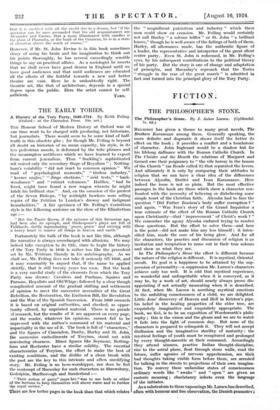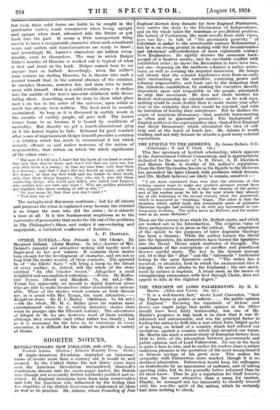FICTION;
THE PHILOSOPHER'S STONE.
The Philosopher's Stone. By J. /Wier Larsen. (Gyldendal. 75. 6d.) RELIGION has given a theme to many great novels, The Brothers Karamazov among them. Generally speaking, the more definite and dogmatic it shows itself the better its effect on the book ; it provides a conflict and a touchstone of character. John Inglesant would be a shadow but for his lifelong dalliance with the Roman Catholic Church. In The Cloister and the Hearth the relations of Margaret and Gerard owe their poignancy to "the vile heresy in the bosom of the Church" (as Reade called it) that separated the lovers. And ultimately it is only by comparing their attitudes to religion that we can have a clear idea of the differences between Alyosha, Dmitri and Ivan Karamazov. Here indeed the issue is not so plain. But the most effective passages in the book are those which show a character con- fronted with the necessity of believing or disbelieving some simple tenet of the Christian faith. Alyosha had to face the question "Did Father Zossima's body- suffer corruption?" and again, "Was Ivan's story of the Grand Inquisitor a true estimate of the effect of the Roman Catholic Church upon Christianity—that ' improvement ' of Christ's work ? " We remember the agony Alyosha endured trying to resolve these questions. But the effort to solve them—and here is the point—did not make him any less himself ; it inten- sified him, made the core of his being glow. And for all the characters, the practice and discussion of religion is an invitation and temptation to come out in their true colours and show us what they are.
In The Philosopher's Stone the effect is different because the nature of the religion is different. It is mystical, Oriental, occult. Its goal is a happiness to be attained by the sup- pression of personality—a suppression Mr. Larsen's characters achieve only too well. It is odd that mystical experience, so wonderful and unforgettable when it is conveyed, as it may be, by a work of art, should nearly always prove dis- appointing if not actually nauseating when it is described. At first, when Mr. Larsen is ascribing mystical emotions to the unfolding consciousness of a child, we are delighted. Little Jens' discovery of Heaven and Hell in Kristen's pipe, his belief in the healing properties of the elder tree, are exquisitely imaginative and exquisitely appropriate. The book, we feel, is to be an exposition of Wordsworth's philo- sophy ; this is the vision and the gleam and we are to watch it fade into the light of common day. But none of the characters is prepared to relinquish it. They will not accept disillusion and the imaginative sterility of maturity : the mystical feelings of youth must be recaptured and prolonged by every thought-narcotic at their command. Accordingly they attend seances, practise Indian thought-discipline, rise to the astral plane, float through stone walls, read the future, suffer agonies of nervous apprehension, see their bad thoughts taking visible form before them, are arrested for talking in the streets to projections of their own imagina- tion. To convey these unfamiliar states of consciousness ordinary words like " awake " and " open " are given an esoteric meaning ; charlatanry infects even the language of the initiates.
As a substratum to these vapourings Mr. Larsen has described, often with humour and fine observation, the Danish peasantry ;
but even these solid forms are liable to be caught in the spiritualist vortex, made transparent when living, upright and opaque when dead, advanced into the future or put back into the past. It seems a little unimportant thing merely to have a recognizable character when such sensational vents and outlets and transformations are ready to hand ; and accordingly Mr. Larsen's characters are seldom recog- nizable, even to themselves. The way in which Holger Enke's murder of Hansine is worked out is typical of what is best and worst in-the book. Holger cannot bear to see anyone hurt or bullied. Accordingly, when the miller's man seduces his darting Hansine, he is thrown into such a mental tumult that, in the natural absence of the criminal, he ravishes Hansine, murders- her, and then tries to make away with himself. Here is a solid terrible crime : it strikes into the middle of the hero's innocent childhood with devas- tating effect. Something must be done to show what place such a sin has in the order of the universe, upon which so much has already been written. The deed must be morally assimilated. So long as it is discussed in earthly words in the mouths of earthly people, all goes well. The horror comes home to us because it is bound by conditions of mortality. But directly we get a fourth-dimensional peep at it the horror begins to fade. Released for good conduct after years of imprisonment Holger himself provides a solution —a solution which has much to recommend it but which secretly offends us and "makes nonsense of the notion of responsibility, that notion on which the whole significance of the crime rests :—
" But now if I tell you I don't feel the hairs of my head as mine. but only that they're there, and don't feel that my eyes see, but only that there is a seeing ; or that my ears hear, only that there is a hearing ; and that I don't feel my breath as mine, only that it's drawn ; or that my feet walk and my hands do their work, only that these things happen ; then who am I, who did those conflicting things, who loved and killed, who hated and forgave, who neither love nor hate any more ? Who am neither attracted nor repelled, who know nothing of will or- aim?"
"Do you mean by that that you don't exist ? " 'You may say so."
The metaphysical discussion continues ; but for all intents and purposes the crime is explained away because the criminal is no longer the man who did the crime ; he is scarcely a man at all. It is this fundamental scepticism as to the continuity of personality that sucks the life out of the problems in The Philosopher's Stone, and makes it unconvincing and impalpable, a turbulent confluence of fluidities.
L. P. HARTLEY-.



































 Previous page
Previous page